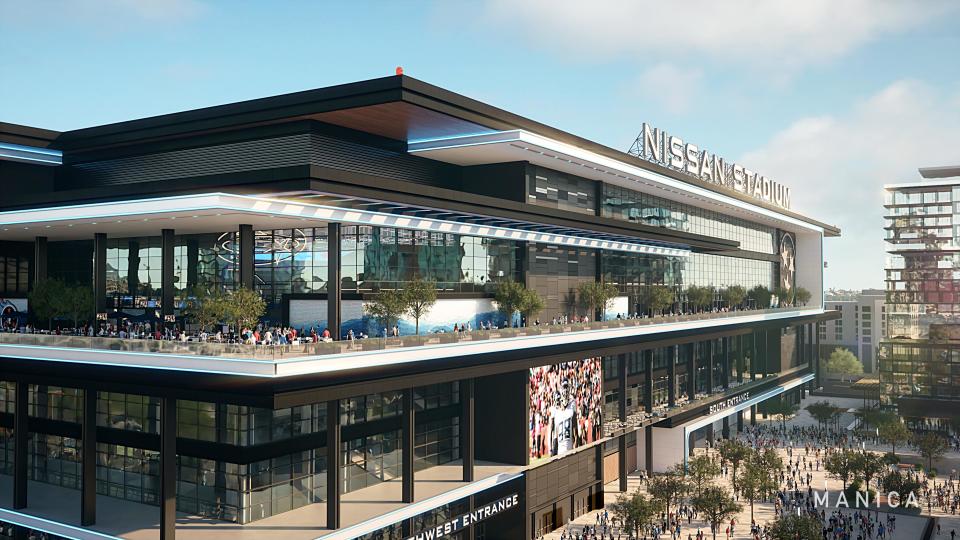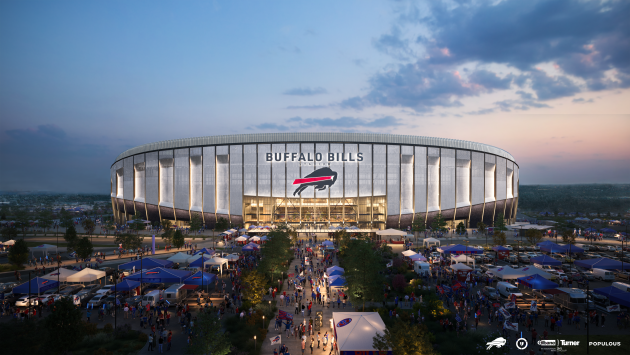Stadium deals in Buffalo and Nashville show how Jacksonville agreement could be shaped
The dust won't settle until May at the earliest on stadium negotiations between the city of Jacksonville and the Jaguars, but recent agreements for the Buffalo Bills and Tennessee Titans offer signposts for what a $1.4 billion stadium deal in Jacksonville might look like for taxpayers and fans.
The deals for the Bills and Titans have provisions binding them to play at the stadiums for the entirety of their 30-year leases. The Bills and Titans agreed they won't even talk to anyone about moving for the first 25 years of the lease and even then, any departure couldn't happen until after the 30-year period ends.
Both deals are built on financing from team owners and from taxpayers for stadiums that could seat about 60,000 fans, the same general capacity that the Jaguars and Jacksonville are considering. Taxpayers will shoulder more than half the cost of building the new stadiums in Buffalo and Nashville.
Mark Woods: Juxtaposition of aging bridges and shiny stadiums is an American story
In a notable difference from what's being negotiated in Jacksonville, the agreements for the Bills and the Titans said the teams could raise some of the ownership's share of stadium funding by selling personal seat licenses. Those licenses allow holders to buy season tickets for specific seats.
The Buffalo News reported last month that Bills' season-ticket holders were experiencing sticker shock after learning it would cost $15,000 to $50,000 for personal seat licenses for suites and club seats in the new stadium when it opens in 2026.
The Jaguars have said they won't seek to sell personal seat licenses and that's not something the team and the city have discussed at any length.
"It didn't seem right for either side," said Mike Weinstein, who serves as counsel to Mayor Donna Deegan in the ongoing negotiations.
Sidley Austin firm hired by Jacksonville also worked on Bills deal
Weinstein said negotiators for the city and the Jaguars are well-versed in the details of the agreements for the Titans, the Bills and other deals approved by NFL owners. Sidley Austin, the law firm hired by Jacksonville to assist on the city's side of the table, filled the same role for New York state in the negotiations with the Bills ownership.
"We look to their agreements as sort of parameters of what the NFL has been willing to agree to, what communities have been willing to agree to, and what teams have been willing to agree to, knowing that every agreement is different," Weinstein said. "Every community is different."
Most of the attention for a Jacksonville stadium deal will be on how much the city would pay for it, but the negotiations cover a host of other terms including how many home games the Jaguars would play each year at the stadium and what kind of community improvements the team would do outside the stadium.
All those topics are in the deals for the Bills and Titans, the most recent agreements that went through the checklist of approvals by the teams, government agencies, and NFL owners.
"It gives us a good model to work with because we don't want to go through the mayor approving it and the council approving it and then the NFL at the last minute not approving it and then we basically start all over again," Weinstein said.
He said the Jacksonville negotiations have been for a 30-year lease, the same length of the agreements reached for the stadiums in Buffalo and Nashville.
Taxpayers put up about 60% of cost for new stadiums
The Buffalo deal for a new stadium had a projected cost of $1.4 billion when it was finalized. The state of New York put up $600 million and Erie County committed $250 million for a total taxpayer share of nearly 61% of the cost. The cost has risen to $1.54 billion and the team's ownership is solely responsible for covering that added expense.
The Titans agreement also centers on a new $2.1 billion stadium deal. The state will pay $500 million and the Metropolitan Sports Authority in Nashville will pay $760 million, so the government's share will be 60% of the cost.

A big difference for Jacksonville is the state of Florida will not be paying anything toward the stadium deal, a position that's consistent with how the state takes a hands-off approach on stadium subsidies across Florida.
"We're on our own," Weinstein said.
The Jaguars proposed last summer a 50-50 split on a potential $2 billion deal that would have renovated the stadium and also built a mixed-use development that could have included apartments, retail, restaurants and entertainment venues on city-owned land next to the stadium. The proposal for the district beside the stadium won't be part of what comes out of the ongoing negotiations, however.
"We discussed the possibility of adjacent land around the stadium, but it was put aside and we only focused on the stadium from that point on," Weinstein said. "But the mayor is interested in looking at developing the land in an appropriate fashion sooner rather than later."
Stadium financing: If city gets stadium deal with Jaguars, it could ask pension funds to be an investor
The stadium renovation, which will completely overhaul the venue with a large amount of new construction, has had a projected cost of $1.4 billion. A year ago, the Jaguars summarized an example of how stadium renovations could cost $1.2 billion to $1.4 billion and the city would pick up 67% of the tab, or a range of $800 million to $934 million for taxpayers. But neither the Jaguars nor the city has said publicly since negotiations began what the cost-share for the stadium would be.
Jacksonville is a small-market city compared to the rest of the NFL so that affects how much the team can generate in local revenue from tickets sales and sponsorships. Jacksonville likewise has a smaller tax base than other cities that are home to NFL teams.
"The goal is to make it fair to both and make it financially manageable for both," Weinstein said.
Non-relocation agreement would be part of Jacksonville stadium deal
In return for large payments of taxpayer dollars, professional sports franchises have sought to prevent teams from moving out during the lease. Weinstein said the non-relocation agreement is an important piece of the Jacksonville negotiations.
"All the other teams have done those, and we'll do one with the Jaguars here," he said.

The non-relocation agreement in Buffalo says the Bills would have to repay 100% of taxpayer investments in the new stadium if the team defaults on the agreement in the first 14 years of the lease. Those damages decrease 6.25% per year for the remainder of the 30-year agreement. The Titans would have to repay the full amount to taxpayers for a default in the first 10 years of the lease, an amount of damages that would then go down by 5% each year for the rest of the lease.
The liquidated damages would be a backstop amount because the agreements say the governments can sue to stop a move.
Both agreements allow the teams to play one home game per year elsewhere if it's part of a "league-wide" program. That would let the teams to play a home game overseas in London and other cities as part of the NFL International Series. The Jaguars have played 10 of their "home games" in London since 2013, the most active team in the NFL for that series.
While the deals for the Bills and Titans have many similar features, they part ways on what taxpayers are responsible for after the stadiums are built — an expense that isn't as big as the initial construction but can add up over a 30-year period.
New York State will put up $280 million over 30 years for maintenance and operations cost of the Buffalo stadium. Erie County will put a 6% charge on parking, ticketing, and concession sales at the stadium that will go toward stadium repairs and maintenance.
In Nashville, the Titans will be responsible for all operations and maintenance costs, removing that expense from Nashville taxpayers.
Jacksonville Mayor Deegan focuses on community benefits agreement
The Titans and the Bills agreed to long-term community improvement programs, which Deegan has said will be , "exceptionally important" for a Jacksonville deal. She has said it should help neighborhood development in the Eastside neighborhood across the Mathews Bridge expressway from the sports complex.
The Titans agreed to give about $48 million during the span of the lease in support of the Nashville Needs Impact Fund directed by the Metro Council for public education, public transit, affordable housing and other needs identified by the city.
The Bills agreed to spend around $100 million over the course of its 30-year lease for its community benefits agreement. The annual payments will be at least $3 million. An oversight committee whose members are appointed by the county, state and the Bills will identify priorities for that spending.
NFL attention: NFL's Roger Goodell meets Deegan and Ron Salem about Jaguars stadium talks

Weinstein said if negotiations are successful, Deegan will bring a package of seven or more separate agreements to City Council "hopefully in May" on different areas such as the renovation of the stadium, community benefits, parking, non-relocation and the lease. He said the city also wants to get the Daily's Place amphitheater and the Miller Electric Center on the same 30-year term as the stadium.
"It's quite complicated," he said. "It's probably 500 pages all told when all of them are together."
The Jaguars current lease goes through the 2029 football season. The city and the team have been working on a timetable for construction to start in 2026 and be finished in time for the 2028 season. That would follow on the heels of the Bills opening a new stadium in 2026 followed by the Titans in 2027.
In Jacksonville, the start of construction in 2026 might not force the team to play home games elsewhere but the stadium would have reduced seating for about 45,000 fans. Weinstein said the talks continue on whether that scenario is workable for the construction schedule.
"That's what we're trying for and it probably will be that, but it's not definite," Weinstein said. "It's a construction question, but that's the goal."
The stadium would be off-limits to Jaguars games in 2027 so the team would need to find another place to play its home games that season.
This article originally appeared on Florida Times-Union: Jacksonville stadium talks can look at Titans and Bills deals
